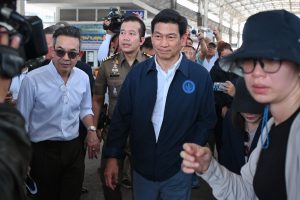Thailand’s Foreign Minister Parnpree Bahiddha-Nukara has unexpectedly resigned, leaving the ministry without leadership at a crucial point in the country’s approach to the conflict in Myanmar. Parnpree Bahiddha-Nukara, who took up his post when Prime Minister Srettha Thavisin took office in early September, said yesterday that he was stepping after a cabinet shuffle saw him lose the post of deputy prime minister.
Four ministers lost their posts in the long-rumored cabinet reshuffle, which was approved by Srettha on Friday and submitted for royal approval over the weekend: Public Health Minister Cholnan Srikaew, Deputy Agriculture and Cooperatives Minister Chaiya Promma, Prime Minister’s Office Minister Puangpet Chunlaiad, and Deputy Agriculture and Cooperatives Minister Anucha Nakasai were all reassigned. Former energy executive Pichai Chunhavajira was also named as the new finance minister, taking the post from Prime Minister Srettha, a reflection of the government’s determination to revive the economy.
According to the official list of changes, which was published in the Royal Gazette over the weekend, Parnpree retained his post as foreign minister, but without the additional title of deputy prime minister. In a resignation letter to Srettha, Parnpree said that he “worked hard with honesty” and that his removal from the deputy prime minister post was not due to his track record.
In a media interview yesterday Parnpree confirmed his resignation but did not offer any more substantial explanation, except to say that the lack of the second post would have hindered his work as foreign minister and that other qualified candidates could head the ministry in his stead. Today, Srettha said that Parnpree’s replacement had been decided but declined to name the successor, saying only that it was a person “who had been working behind the scenes on foreign policy” for his Pheu Thai Party.
The unexpected resignation comes at an unfortunate time. Parnpree was the chair of a recently formed committee on the conflict in Myanmar, and while his approach to the country’s conflict has been criticized by opponents of Myanmar’s military junta, he had begun gradually to reorient Thailand’s policy toward the country. This has been cast into relief over the past few months by the outbreak of serious fighting in Kayin (Karen) State along Thailand’s western border, which has led hundreds of civilians to flee across the border.
Last month, Parnpree launched a humanitarian initiative that saw aid delivered across the border to communities displaced by the fighting, which Parnpree as a possible basis for talks between the military junta and its many opponents. Taken together with the transfer of Deputy Foreign Minister Jakkapong Sangmanee to the Prime Minister’s Office in this week’s shuffle, Parnpree’s resignation deprives the ministry of leadership at an important time.
Speaking to Voice of America this week, before Parnpree’s resignation was announced, Thitinan Pongsudhirak of Chulalongkorn University said that Myanmar had become a “top priority” for Srettha’s government. “I think they want to be the broker; they want to promote dialogue, and the Srettha government wants to play a leading role moving forward,” he told the U.S.-funded broadcaster, adding that they were “open to options” about how to approach the conflict. Thitinan added that this was part of “a broader foreign policy objective about rebalancing and repositioning Thailand as a leader for ASEAN on Myanmar.”
In comments given to Channel News Asia, the spokesperson for Myanmar’s opposition National Unity Government said that it appreciated Parnpree’s “support for wider engagement” and expressed hopes that his replacement will continue to engage with the NUG and its allies to resolve the country’s crisis.
While one can expect the Foreign Ministry to maintain the same trajectory until Parnpree’s replacement is announced – government spokesperson Chai Wacharonke told Reuters that the resignation “will not affect government work in foreign affairs” – the change comes at a time when Thailand’s approach toward Myanmar is in flux and in dire need of leadership. Even if Parnpree’s replacement decides to pursue the same approach, their curve of adjustment will be tight.

































